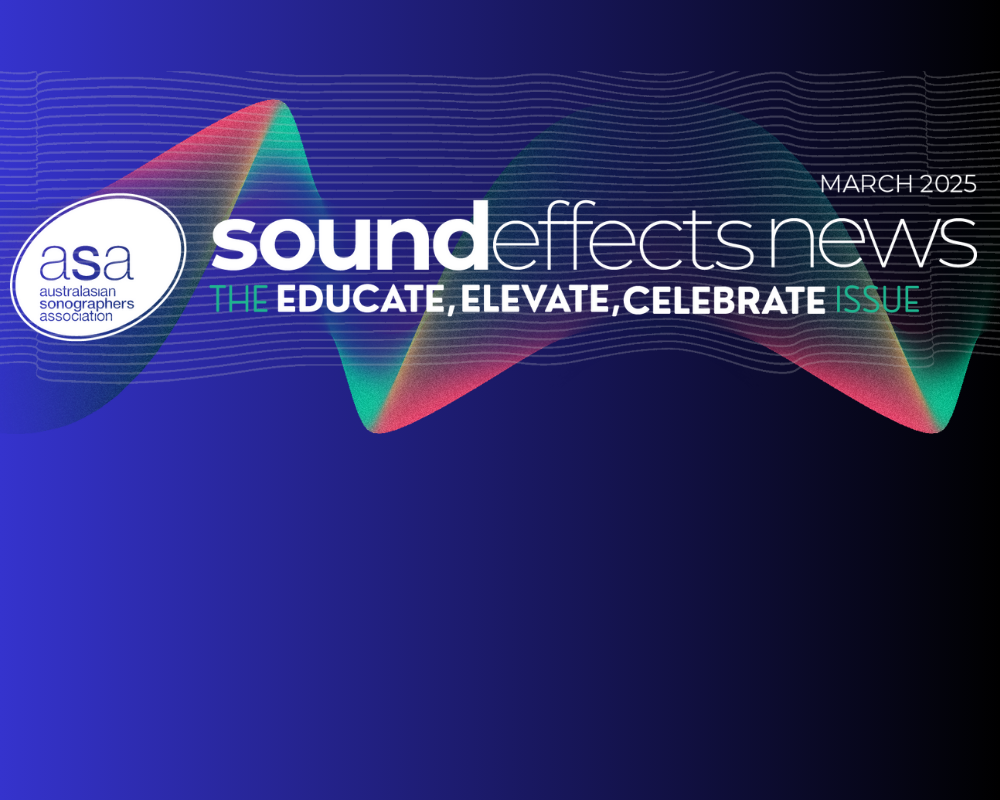
5 minute read
Soundeffects news | Interview with Dr Riwa Meshaka
Dr Riwa Meshaka | PAEDIATRICS | UK
Consultant Paediatric Radiologist | Great Ormond Street Hospital for Children NHS Foundation Trust
Dr Riwa Meshaka is a Consultant Radiologist at Great Ormond Street Hospital for Children NHS Foundation Trust in London. She has special interests in gastrointestinal, genitourinary, and oncological paediatric imaging, with research focusing on midgut malrotation and bowel imaging in paediatric inflammatory bowel disease.
At ASA2025 Melbourne, Dr Meshaka will share her expertise in paediatric ultrasound, discussing the challenges and rewards of imaging younger patients. In this interview, she reflects on her first visit to Australia, key skills for sonographers working with children, and strategies for making paediatric patients more comfortable during examinations.
What are you most looking forward to about visiting Melbourne and engaging with an Australasian audience?
I am so very excited about ASA and Melbourne! Having never been to Australia, I cannot wait to see what Melbourne has to offer and look forward to experiencing the vibrancy and culture of the city. I am a big foodie and love running, so I look forward to trying out some of the excellent eateries as well as finding time to pound the pavement, maybe even a trail or two! Many of my amazing sonographer friends trained in Australia, and ASA has been on my conference hit list for quite some time. I look forward to immersing myself in learning from the ASA community and growing my network of colleagues and friends with a common interest in ultrasound excellence.
Paediatric imaging presents unique challenges. What are the key skills or knowledge areas you believe sonographers must develop to excel in this field?
Paediatric ultrasound can certainly be challenging but also extremely rewarding. In many ways, babies and children are the perfect ultrasound candidates. Done well, ultrasound in children can not only make critical diagnoses but can avoid other lengthy, costly and radiation-burdening examinations. I think the most important skill in successful paediatric sonography is knowing how to talk to the child. Being able to understand and engage with the child in front of you, making them feel safe and comfortable, is half of the job. Getting to know some age-appropriate fan-favourites like Paw Patrol and Bluey, being au fait with a few major sports teams, and being effortlessly able to hold and help parents comfort a baby will all go a long way. The technical aspect is getting to know the normal sonographic appearance of paediatric anatomy thoroughly enough to recognise abnormal when it comes your way, and this comes with regular and thoughtful practice. Getting quick at knobology can also help out in sticky situations with wriggly children!
What strategies or approaches do you recommend to make paediatric patients feel more comfortable during an examination?
Meeting children in the waiting room is really helpful at establishing an initial rapport and getting early engagement as you can see what they are playing with while waiting and use it as an ‘in’. Once in the room, I try to explain the test in a child-friendly way – ‘We’re going to put jelly on the belly to see what you had for breakfast’. I try to build a rapport with the parents; many children tend to relax if Mum and Dad are happy and talking. Stickers are incredibly helpful and I tend to give the child stickers before the examination – you want them to like you while they are in the department, not on the way home! IPads with music and videos can be helpful too, particularly for toddlers, who can be really difficult to engage. Taking the parents’ lead as to what the child likes is useful, as well as taking it slowly, trying not to rush the child before they are ready.
What aspects of paediatric ultrasound do you find the most rewarding?
Ultrasound is the best part of my job as a paediatric radiologist. I love being able to work with children and their families in trying to get the best possible diagnostic images to direct their clinical care. I value being able to see anatomy and pathology in such exquisite detail on ultrasound that no other modality can provide. I also thoroughly enjoy the problemsolving aspect and using a variety of tools and techniques to obtain key management-changing diagnostic images. I especially like successfully obtaining images in a challenging patient – it takes time and patience, but the prize is worth it, and the parents are often so grateful. I enjoy learning from our patients every day, with unexpected and sometimes inexplicable findings that trigger thought-provoking discussions with colleagues and the multidisciplinary team.
Explore Dr Riwa Meshaka’s ASA2025 Program
SESSION TIME | PRESENTATION
FRI 12:30 – 1:20pm | Sound Stage: Paediatric bowel
FRI 1:30 – 2:20pm | Table Talks: The acute paediatric abdomen
SAT 3:45 – 5:05pm | Novel techniques in paediatric ultrasound
SUN 9:00 – 10:20am | Paediatric inflammatory bowel disease
SUN 9:00 – 10:20am | Gut malrotation









